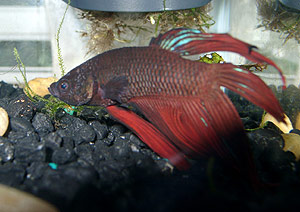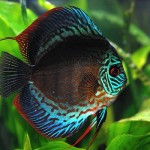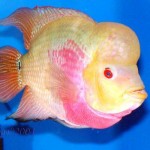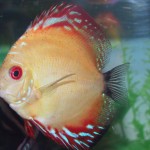Ok, let’s assume that your betta really is getting on in years. What are some of the symptoms you may notice? There are several physical changes that may occur. Most noticeably, his color may change subtly or dramatically over time and eventually become very dull and even brown. Iridescent coloration may fade entirely leaving a very bland or muted shade behind. Despite regular feeding you may notice the fish becomes gradually thinner and even bony. The individual scales may become more prominent and your betta may loose his scales more often. You may have noticed the occasional white, acne-like spot on your fish in the past. These are very common among bettas and don’t seem to cause any harm. Older bettas may develop these more frequently. Chronic fin rot may creep up. This fin loss tends to last indefinitely and does not improve with medication or changes in water parameters. It can develop in even the best water conditions. One of the most common physical symptoms of aging in bettas is loss of sight. You may find that your betta frequently lunges for food and misses or doesn’t recognize movement outside the tank like he used to. Some bettas develop what can only be characterized as cataracts. When observing the eyes you may see a filmy coating covering much of the eyeball that is also common in aging people.
Behavioral symptoms also present themselves in aging bettas. Lethargy is probably the most noticeable. Young, healthy bettas should be quite active, exploring their tanks and wiggling for their humans. Older bettas often lay in the plants or on the bottom of the tank most of the day. Again, this should be a gradual slow in activity levels. A betta that suddenly becomes lethargic may have an illness. Older bettas may not show the enthusiasm for food like they used to. They may show less interest in their humans or stop their “wiggle dances” entirely. Their tenacity for flaring may lessen over time as well. A betta that used to put on a show for other males or his own reflection may not display with the gusto he once did. Both males and females may become much less aggressive as they get well past their breeding years.

Because older fish may be less able to fight off disease and more prone to illness then younger ones, it is important to be vigilant and take the appropriate measures to keep them healthy. Being consistent with water changes and providing a nutritious diet will help prolong your betta’s life.

















I really like and appreciate your blog post.Thanks Again. gkeedkdcaeeg
you may have an important weblog here! would you prefer to make some invite posts on my blog? gekgbdccakdf